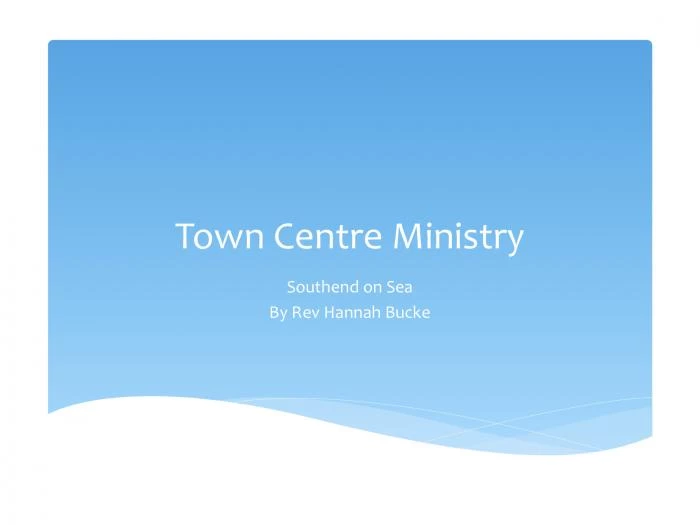As you read this, the summer holiday season will be drawing to a close but as I write, our seaside town centre is at its busiest. Southend becomes a truly a multicultural and multigenerational place as thousands of visitors and residents enjoy our seafront and beaches. There is something very special about being here at this time of year – watching families of every creed and culture enjoying time together, seeing children, parents, grandparents, playing in the water fountains. Who knows? Perhaps there are glimpses of the Kingdom to be had here if we open our eyes to it.
The chaplaincy to Stockvale Ltd (Adventure Island and a number of other seafront businesses) is in great demand during high season and there have been a growing number of staff getting in touch as the business reaches peak staffing. Much as I have experienced before, the pastoral issues they bring are often serious, complex and difficult. However, being able to provide a safe space for these young people to talk, offering them support, care and attention, and signposting them to further help can be a lifeline.
It is heartening to reflect upon how the chaplaincy has developed over the past three years: I have been joined by Rev Dan Pratt and Rev Jim Kilpin; we have delivered training to team leaders and senior staff two years running on basic listening skills, mental health, and staff welfare; all new staff will meet a chaplain and hear about our service at their induction; the numbers of staff seeking out chaplaincy support suggests that many staff feel comfortable talking to us and that this is a much-needed service.
One important recent development is that we are now piloting a counselling service, which will offer a small number of staff professional counselling paid for by Stockvale. I have been keen to find a way for those most in need to receive counselling, knowing that NHS services are stretched to breaking point and that many young people would struggle to afford private fees. I am grateful to Philip Miller and the other directors at Stockvale for supporting this pilot scheme, and to the counsellor who has agreed to work with us. It has been an answer to prayer.
One positive piece of feedback about the chaplaincy came from a member of staff who had left the company to work for another employer: at their exit interview they reported that they were rather disappointed to find no chaplaincy service was on offer in their new workplace. I rather like the idea of hundreds of young people expecting to find a chaplain in every workplace! More seriously though, this is a real challenge to us – there is clearly a great need for this ministry in the wider world. How can we best respond to this when our resources are limited or channelled into different activities? Can we better prioritise the resources we do have?
In addition to the chaplaincy at Stockvale, the chaplaincy at HARP is continuing to grow and embed. I now feel very much part of the furniture at Vera House, the hostel for former rough sleepers with complex needs, and am also regularly working up the road at the Bradbury Centre, thanks to a new member of staff who has been keen to encourage chaplaincy there too. Pastorally, the issues are again complex and difficult. However, the level of other forms of support at HARP mean that it is often the spiritual aspects of life that are more often the focus of chaplaincy here. It has been interesting to reflect upon the importance of the Church's rituals (from a variety of denominations) to some of those I minister to at HARP – prayer, confession, forgiveness, memorial. Whilst it is vital that we find new ways to enact our faith with people outside the Church, I have become aware that some of the old ways have their place too. It is also worth noting that the staff as well as the residence are making use of chaplaincy in what is a very demanding working environment.
From the start of my ministry in the town I have wanted to find ways to share my experiences and reflections as widely as possible, believing that when we experiment with new models of mission and ministry we must share our learning with others. One of the ways I have been doing this is through the Professional Doctorate in Practical Theology. I have now completed the first stage of this course and am ready to proceed to my original research. This will be through interviews with other presbyters in pioneering appointments, exploring with them how a ministry of Word and Sacrament (in the broadest sense) can be exercised in secular missional contexts and what impact this may have on the mission of the Church. Watch this space!
I have also been privileged to share the story and experience pioneering a town centre ministry with others interested in setting up mission projects in their area. Recently I have welcomed a student from the United States, where pioneer ministry does not exist...yet, but who wants to start her own outreach ministry as an ordained elder (presbyter) in the United Methodist Church. She spent a day with me in the town centre and I was able to reflect with her on nature of pioneer ministry – both practical and theological. I also welcomed a student minister and his superintendent from Northern Island for a visit. They are planning to set up a city centre ministry in Belfast and again spent a day in town with me reflecting on models of ministry in urban centres.
I have plenty of opportunities to share my learning across the Connexion in the coming months as I lead workshops in pioneer mission and ministry at the BEH Autumn synod, the Eastern Region 'Reimagine' conference in October, and the Yorkshire Plus Region 'Reimagine' conference on chaplaincy in November.
Finally, over the past few months I have been discerning a call to chaplaincy in the Army Reserves, something that has taken me rather by surprise. Like all those who work and offer for service in the reserves, clergy can give some of their spare time to serve as chaplains to a reserves unit in their area. Given my experiences of developing new chaplaincies in pastorally demanding contexts and my heart for pioneering (there are only a handful female chaplains in the Army at this time – pioneering takes many forms!), I felt this was a ministry I could offer. The application process has been rather gruelling and rigorous. As well as passing an interview with the Methodist Forces Board, it included physical, psychological and aptitude testing over three days at the Army Officer Selection Board. I am very pleased to report that I passed and have been offered a reserve chaplaincy posting to 254 Medical Regiment Reserves Unit. I hope this ministry will complement my ongoing work in the town centre and I hope I will have opportunities to share more about it as it develops.
Many thanks for your ongoing prayers and support for my work in Southend Town Centre.
Rev Hannah Bucke
Get In Touch
Southend & Leigh Methodist Circuit
Highlands Methodist Church,
Leigh-on-Sea,
SS9 3PT


